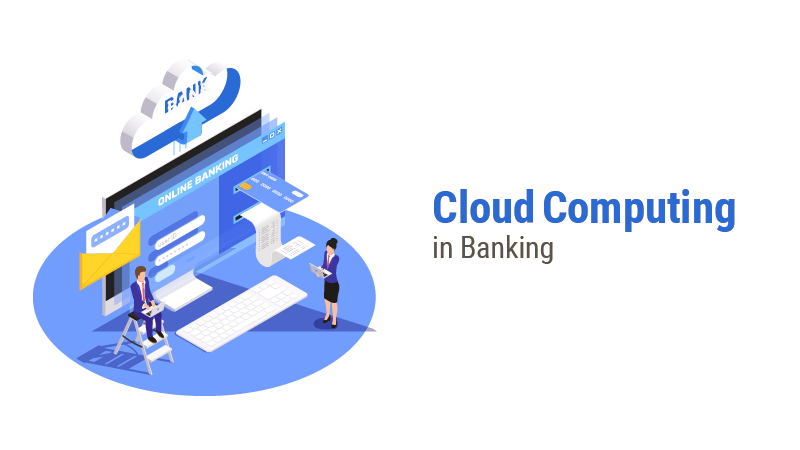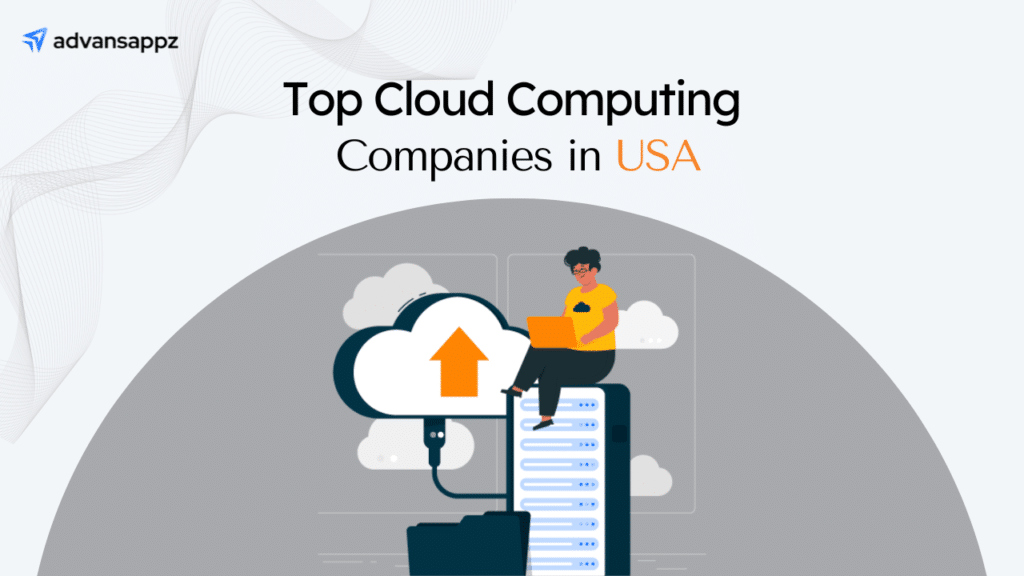The banking industry is witnessing a rapid digital transformation fueled by technological advancements and changing customer expectations. In this era of digitalization, traditional banking models are being challenged, and financial institutions are seeking innovative solutions to stay competitive. One such solution that has gained significant traction is cloud computing.
Cloud computing has revolutionized businesses’ operations, offering a flexible, scalable, and cost-effective infrastructure for storing, managing, and processing data. Cloud computing for banking has become a necessity rather than a luxury for the sector.
A recent poll conducted by Google Cloud and the Harris Poll revealed that 83% of financial service organizations are utilizing cloud technologies to some extent.
Let’s discuss why cloud computing has become indispensable for the banking industry. Furthermore, we will highlight some prominent cloud service providers that cater specifically to the banking sector and the vital role of cloud consultancy in helping banks successfully navigate their cloud adoption journey.
Significant Benefits of Cloud Computing in Banking
The banking industry has been transformed by cloud computing, providing numerous benefits that affect their operations and customer service. Here are some of the valuable benefits of cloud computing in banking.
Enhanced Scalability and Flexibility
Cloud computing allows banks to scale their infrastructure and services to meet fluctuating demands quickly. For instance, during peak periods, banks can scale up their computing resources to handle increased transaction volumes and customer interactions. Contrarily, they can scale down to save costs. This flexibility ensures optimal resource utilization and cost efficiency.
Example: A bank experiences a surge in online transactions during a promotional sale. By leveraging cloud computing, the bank can seamlessly scale its online transaction processing capabilities to handle the increased load, ensuring a smooth customer experience without any system slowdowns or downtime.
Cost Reduction and Operational Efficiency
By adopting cloud computing, banks can significantly reduce their upfront capital expenditures on physical servers, data centers, and networking equipment. This allows them to reallocate their resources strategically and save costs. They can also take advantage of pay-as-you-go pricing models, which means they only pay for the services they use.
Example: By migrating its customer relationship management (CRM) system to the cloud, a bank eliminates the need for maintaining on-premises servers, reducing hardware costs and the expenses related to power consumption, cooling, and ongoing maintenance. The bank can allocate those savings to other strategic initiatives or improving customer experiences.
Strengthened Security and Compliance
Cloud service providers offer robust security measures and compliance frameworks tailored to the banking industry’s stringent requirements. They employ state-of-the-art encryption, access controls, and constant monitoring to protect sensitive financial data. Cloud providers also ensure data redundancy and backup, decreasing the risk of data loss due to hardware failures or disasters.
Example: A bank leverages a cloud provider’s advanced security features to protect customer data against potential cyber threats. The cloud provider’s expertise and continuous monitoring help detect and mitigate security incidents promptly, reducing the bank’s vulnerability to data breaches.
Innovation and Agility
Banks can use cloud computing to develop and launch new services quickly, which helps them to bring them to market faster. Cloud-based development platforms, tools, and technologies, such as containers and serverless computing, can be used to create and deploy applications rapidly. Furthermore, banks can use cloud-based AI (Artificial intelligence) and ML (Machine Learning) services to gain insights from data, automate tasks, and provide personalized experiences for their customers.
Example: A bank develops and deploys a mobile banking application on a cloud platform, leveraging its scalability and advanced features. The bank can seamlessly integrate additional services, such as chatbots or voice assistants, to enhance customer interactions and provide personalized financial advice.
Improved Collaboration and Mobility
Cloud-based collaboration tools and virtual workspaces enable geographically dispersed teams within a bank to collaborate effectively. Employees can access and share data, documents, and applications in real time, facilitating efficient teamwork and streamlined decision-making. Cloud computing also enables secure remote access, allowing employees to work from any location and device, enhancing flexibility and productivity.
Example: Bank employees in different branches can collaborate on a loan approval process using cloud-based document sharing and workflow tools. This enables real-time collaboration, reduces manual paperwork, and accelerates the loan approval cycle.
Disaster Recovery and Business Continuity
Cloud computing provides banks with robust disaster recovery and business continuity capabilities. Data replication across multiple geographic locations ensures that critical banking systems and customer data remain accessible even during unforeseen events such as natural disasters or cyberattacks. Banks can quickly recover operations, minimize downtime, and maintain customer service continuity.
Example: In the event of a data center failure caused by a severe storm, a bank’s cloud-based disaster recovery solution ensures that customer transactions and banking services seamlessly switch to a secondary data center without disruption, preserving business continuity.
Future Trends and Challenges in Cloud Computing for Banking
- Edge Computing: Banks are exploring edge computing to process data closer to the source, improving transaction speed and enabling real-time data analysis for branch operations and mobile banking applications.
- Advanced-Data Analytics and AI: Cloud computing combined with data analytics and AI capabilities empowers banks to gain valuable insights, enhance risk management, detect fraud, and deliver personalized financial recommendations.
- Hybrid and Multi-Cloud Strategies: Banks embrace hybrid and multi-cloud strategies to optimize infrastructure, achieve security and compliance, and leverage the best services from multiple cloud providers.
- Security and Privacy Challenges: Financial firms face unique security challenges in safeguarding customer data in the cloud. Close collaboration between banks and cloud service providers is essential to implement robust security controls, encryption, and continuous monitoring.
- Regulatory Compliance: Banks migrating to the cloud must ensure compliance with regulations like GDPR and PCI DSS. Cloud service providers must demonstrate adherence to these regulations and offer tools and services to assist banks in meeting compliance requirements.
Prominent Cloud Service Providers in Banking
- Amazon Web Services: AWS is a top cloud service provider for the banking industry. It offers a wide range of services, such as data storage, compute power, AI, ML, and vigorous security features that can be customized to meet the unique requirements of financial institutions. Its scalability, reliability, and global infrastructure make it a preferred option for established financial institutions and emerging fintech startups.
- Microsoft Azure: Microsoft Azure provides a broad range of cloud services that cater to the unique requirements of the banking sector. With IaaS, PaaS, AI, ML, and advanced analytics offerings, Azure empowers banks to leverage cutting-edge technologies and drive innovation. Azure’s deep integration with Microsoft’s productivity tools, such as Office 365 and Teams, enables seamless collaboration and integration across various banking systems, enhancing efficiency and productivity.
- Google Cloud Platform (GCP): GCP offers a secure and scalable cloud infrastructure that supports the operational needs of banks. With its robust data storage, compute capabilities, data analytics tools, and AI/ML capabilities, GCP enables banks to harness advanced technologies and drive transformative changes in their operations. GCP’s commitment to security and compliance, coupled with its focus on sustainability, makes it an attractive choice for banks looking for a reliable and environmentally conscious cloud provider.
The Role of Cloud Consultancy
Cloud computing solutions are crucial in assisting banks throughout their cloud adoption journey. Their expertise and guidance help banks navigate the complexities associated with cloud computing. Here are some critical aspects of the role of cloud consultancy:
Cloud Service Provider Selection
Cloud computing solutions assist banks in evaluating and selecting the most suitable cloud service provider based on their specific requirements, such as security, compliance, scalability, and cost-effectiveness. They conduct thorough assessments considering factors like service offerings, industry expertise, and reputation to ensure that the chosen provider aligns with the bank’s goals and objectives.
Cloud Architecture Design
Cloud services work closely with banks to design robust and efficient cloud architectures that meet their operational needs. They analyze existing systems, identify areas for improvement, and propose cloud-based solutions that optimize performance, scalability, and security. They also help banks incorporate hybrid or multi-cloud strategies when necessary, ensuring seamless integration with existing on-premises infrastructure.
Regulatory Compliance
Compliance with industry regulations is critical to cloud adoption in banking. Cloud consultants assist banks in learning and addressing regulatory needs, such as data privacy, data residency, and security standards. They help banks design and implement security controls, encryption mechanisms, and access management policies to guarantee compliance with applicable regulations.
Migration and Change Management
Cloud consultants guide banks through the migration process, ensuring a smooth transition from on-premises systems to the cloud. They develop migration strategies, plan data transfer, and execute the migration while minimizing disruption to banking operations. Consultants also provide change management support, helping banks train employees, address concerns, and embrace the cloud-based environment effectively.
Also check: Cloud Computing Solutions
Final Words
The banking industry has found cloud computing to be very useful in improving operations, security, and customer services. By using cloud computing services like AWS, Azure, and GCP, banks can be more efficient, and scalable and work better together.
In addition, when you choose from the best cloud consultancy providers, they can help banks make the most of cloud computing and stay competitive in the changing banking industry.
Frequently Asked Questions
Cloud computing for banking refers to the use of remote servers hosted on the internet to store, manage, and process data and applications, offering banks scalability, flexibility, and cost-efficiency for their IT infrastructure.
In AI, a database refers to a structured collection of organized data that is stored and managed electronically. Databases play a crucial role in AI by providing a centralized repository for storing and retrieving data used to train, test, and operate AI models. They enable efficient data storage, retrieval, and manipulation, supporting AI tasks such as training machine learning models, natural language processing, and data analysis. Databases help AI systems access and process information, facilitating better decision-making and more accurate predictions.
Cloud providers employ robust security measures, including encryption, access controls, and compliance certifications, making cloud computing a secure choice for storing and processing sensitive financial information.
Banks may encounter challenges such as data privacy concerns, regulatory compliance, and vendor lock-in while migrating to the cloud, necessitating careful planning and risk assessment.

















